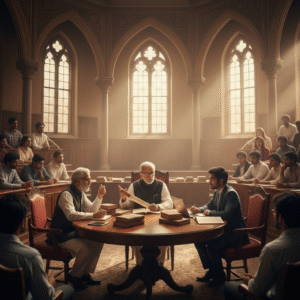Truth is a concept that has fascinated humanity for centuries, with religion and philosophy offering distinct yet intersecting pathways to understanding it. While religion often defines truth through divine revelation and faith, philosophy pursues it through reason, logic, and inquiry. This article explores these contrasting approaches and their implications for comprehending reality.
Religion: Truth as Divine Revelation
In religion, truth is rooted in faith and sacred teachings, often regarded as absolute and eternal. Religious texts, such as the Vedas, Quran, or Bible, are seen as the ultimate sources of truth, providing moral guidance and answers to existential questions.
Key Characteristics of Religious Truth:
- Faith-Based: Truth is revealed through divine intervention or sacred scriptures, requiring belief rather than evidence.
- Unchanging: Religious truths are often considered timeless, unaffected by external circumstances.
- Moral and Spiritual: Truth serves to guide ethical behavior and spiritual growth.
- Community-Centric: Truth in religion often fosters a shared sense of identity and belonging.
For instance, in Hinduism, the concept ofSatya(truth) is linked to the divine order of the universe, emphasizing the moral and spiritual alignment of individuals with cosmic principles.
Philosophy: Truth Through Rational Inquiry
Philosophy, in contrast, approaches truth as a dynamic concept to be explored and debated. Philosophical inquiry questions assumptions, challenges dogmas, and seeks logical coherence in understanding reality.
Key Characteristics of Philosophical Truth:
- Reason-Based: Truth emerges through rational analysis and empirical evidence.
- Evolving: Philosophical truths adapt to new contexts, discoveries, and critiques.
- Individualistic: Truth is often a personal journey, open to interpretation and debate.
- Universal Scope: Philosophical truths aim to transcend cultural or temporal boundaries.
Indian philosophical traditions likeNyaya(logic) andAdvaita Vedanta(non-dualism) exemplify this approach by emphasizing logical reasoning and self-inquiry in the pursuit of ultimate reality.
Comparing Religious and Philosophical Truth
| Aspect | Religious Truth | Philosophical Truth |
| Basis | Divine revelation and faith. | Reason, logic, and inquiry. |
| Nature | Absolute and eternal. | Dynamic and evolving. |
| Purpose | Moral guidance and spiritual growth. | Understanding existence and the nature of reality. |
| Methodology | Based on belief in sacred texts and doctrines. | Encourages questioning and debate. |
| Community Role | Fosters shared identity and cultural cohesion. | Focuses on individual intellectual exploration. |
The Intersection: Seeking Truth Through Faith and Reason
While religion and philosophy often seem to diverge in their pursuit of truth, they also intersect. For example, theBhagavad Gitaharmonizes devotion (Bhakti) with knowledge (Jnana), illustrating that truth can encompass both faith and reason.
Modern thinkers argue for integrating religious and philosophical perspectives to address contemporary challenges. TheSupreme Court’s 2024 rulingon including ethics and philosophy in educational curricula is a step toward fostering critical thinking alongside moral grounding.
Relevance in a Contemporary Context
In today’s world, the nature of truth remains a pivotal discussion. Religion continues to provide solace and moral direction, while philosophy equips individuals with tools to navigate complex realities. Together, they offer complementary pathways to understanding life’s mysteries.
For instance, ecological ethics inspired by Vedic teachings and philosophical debates on sustainability underscore how these approaches can address pressing global issues.
Conclusion: Truth as a Multidimensional Pursuit
Religion and philosophy approach truth from different angles—one through faith and divine revelation, the other through reason and inquiry. Yet, their interplay enriches humanity’s quest for understanding.
By embracing both perspectives, individuals can explore the multifaceted nature of truth, balancing spiritual wisdom with intellectual rigor to navigate an ever-evolving reality.











